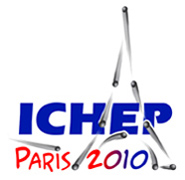Speaker
Chris Blanks
(Imperial College)
Description
Prompt K0_s production in pp collisions at the LHCb experiment
The inclusive production of prompt K0_s mesons, which are either produced directly in the fragmentation process or in the decay chain of prompt resonances decaying strongly or electromagnetically, has been studied with the very first data collected in pp collisions at sqrt(s) = 0.9 TeV using the LHCb detector in December 2009. K0_s decays are identified kinematically using the information recorded by the LHCb tracking detectors, in events passing a minimum bias trigger. The absolute differential production cross section is measured as a function of the K0_s transverse-momentum (pT ) and rapidity y in the region 0.2 < pT < 1.6 GeV/c and 2.5 < y < 4.0. The pT spectra, which are a sensitive probe of the hadronization mechanism, are compared with predictions from specific tunings of the PYTHIA generator. Preliminary results obtained at sqrt(s) = 7 TeV may be shown as well.
Baryon/anti-baryon production studies at LHCb
Baryon number and strangeness can be used to probe the fragmentation field. Predictions for the inclusive production of baryons and anti-baryons at LHC energies differ significantly between models tuned on the same lower-energy data, especially at large pseudo-rapidities (eta). The LHCb experiment, with its forward coverage (2 < eta < 5), is in a unique position at LHC to study how well the quantum numbers of the beam particles are transported to the central region. Preliminary results on the inclusive production of protons and anti-protons, as well as Lambda and anti-Lambda hyperons, will be presented, with a specific emphasis on the baryon/anti-baryon production ratios as a function of rapidity, transverse momentum, and center-of-mass energy. Measurement will be compared with predictions from Monte Carlo generators tuned on experimental results.
First studies with J/psi signals at LHCb
An important part of the LHCb physics programme relies on the ability to efficiently trigger and cleanly reconstruct J/psi -> μ+μ− decays. The first heavy flavour measurement at LHCb will concern J/psi production, and open the road for further quarkonium and B physics studies. Experience on the triggering and reconstruction of J/psi decays acquired by LHCb during the initial phase of the LHC startup at sqrt(s) = 7 TeV will be reported. Contributions of J/psi from b-hadron decays will be separated from prompt J/psi produced directly in the pp collisions or in the decays of heavier prompt states. Preliminary results on the prompt and non-prompt J/psi production cross section will be presented as a function of the J/ transverse-momentum (pT ) and rapidity (y) in the range 3 < y < 5 and pT < 7 GeV/c.




